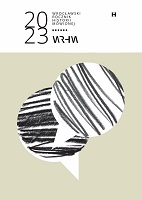Regional and city oral archives as places inspiring changes in cultural memory – the example of the Gdańsk Oral History Archive
Regional and city oral archives as places inspiring changes in cultural memory – the example of the Gdańsk Oral History Archive
Author(s): Andrzej HojaContributor(s): Agata Wiącek (Translator)
Subject(s): Cultural history, Museology & Heritage Studies, Archiving, Oral history, Social history, Cultural Anthropology / Ethnology
Published by: Ośrodek »Pamięć i Przyszłość«
Keywords: essay; oral history; archives; cultural memory;
Summary/Abstract: On several occasions in the 20th century, the city of Gdańsk has been the backdrop of events that became a part of both local and broader Polish cultural memory, that is a certain canon of knowledge about the past included among others in school curricula and the calendar of annual celebrations and commemorative events.1 Among these we could list the conflict concerning the city’s nationality after the First World War and the establishment of the Free City of Gdańsk, the start of the Second World War with the attack on Westerplatte, the events of December 1970, the anti-communist movement, the strikes of 1980 in the Gdańsk shipyard and the subsequent foundation of the Independent Self-Governing Trade Union ‘Solidarity’ (NSZZ ‘Solidarność’), the martial law, or the mass internment of Gdańsk opposition activists. Institutional and community oral archives existing in the city since the first decade of the 21st century would collected recordings of accounts by residents of Gdańsk who had been associated with these events in some way. Such recordings make up a large part of the archival collections of the Institute of National Remembrance,2 the European Solidarity Centre3 and the Museum of the Second World War in Gdańsk.4 Individuals recorded by the first two institutions are predominantly people associated with political opposition during the Polish People’s Republic. When it comes to the Museum of the Second World War, the accounts are from those who remembered the experience of the war. Archives profiled in this manner were also more likely to gather topic- -oriented stories rather than life stories.
Journal: Wrocławski Rocznik Historii Mówionej
- Issue Year: 2023
- Issue No: 13
- Page Range: 304-314
- Page Count: 11
- Language: English

